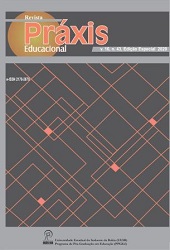FENOMENOLOGÍA Y EL DESARROLLO DE UN ESTILO DE GESTIÓN INNOVADOR EN LICEO EDUCACIONAL MODERNO
DOI:
https://doi.org/10.22481/rpe.v16i43.6841Palabras clave:
Liceo educativo , Estilo de gestión innovador , Un modelo para el manejo innovador del LiceoResumen
El propósito de este artículo es presentar las características, el contenido y la lógica del desarrollo de un estilo de gestión innovador entre los directores de los liceos en la Rusia moderna. El estudio revela las características específicas de este estilo de gestión, que se reduce a la capacidad del gerente para promover el espacio educativo del Liceo al estado de un sistema en desarrollo dinámico que cumple con los requisitos modernos para la formación de especialistas en economías innovadoras. Un criterio clave para un estilo de gestión innovador fue la capacidad de un gerente de hacer una contribución personal para inculcar la innovación. Este criterio permitió identificar los niveles de crecimiento del estilo innovador de gestión del liceo (reproductivo, adaptativo, modelado local, modelado de sistemas, innovador-creativo). El estudio desarrolló un modelo de actividad gerencial innovadora del jefe del liceo, que apunta a la formación de un potencial de liderazgo constructivo y un dinámico "auto-concepto" de gestión. Se revela la lógica de la formación de un estilo de gestión innovador, que consta de tres etapas: reflexiva, identificación y la etapa de autorrealización profesional. Como resultado de la aplicación de esta lógica, los gerentes del grupo experimental desarrollaron una mejor tolerancia y flexibilidad del posición, aumentaron su creatividad, su capacidad para resistir el estrés prolongado, se controlaron mejor, la situación y la comunicación, tomaron las decisiones necesarias más rápido, mostraron confianza en sí mismos y capacidad de ejercer influencia gerencial y pedagógica, capacidad de gestionar una situación social, asumir la responsabilidad.
Descargas
Citas
DERKACH, A.A. (2004). Akmeologic basis of development of professionalism. Moscow-Voronezh. 750 p.
DIMMOCK, C. (Ed.) (1993). School-based management and school effectiveness. Abingdon: Routledge.
DIESTERWEG, A. (1956). Selected pedagogical essays. Moscow: Uchpedgiz. 374 p.
DRUCKER, P. (2007). Innovation and Entrepreneurship: Practice and Principles. Butterworth-Heinemann.
GUILE, D. & GRIFFITHS, T. (2001). Learning through work experience. Journal of Education and Work, 14(1), 113–131.
FAYOL, H. (1949). General and Industrial Management. Translated by C. Storrs, Sir Isaac Pitman & Sons, London.
HOFFMAN, A. & SPANGEHL, S. (Eds). (2011). Innovation in Higher Education: Igniting the Spark for Success. American Council on Education, Rowman & Little field Publishers Inc., Lanham, MD.
IACOCCA, L. & WHITNEY, C. (2008). Where Have All the Leaders Gone? New York/ London/ Toronto/ Sydney: Scribner.
JERSILD, A.T. (1955). When teachers face themselves. Oxford, England: Bureau of Publications, Teachers Co.
KLIMOV, E.A. (1998). Introduction to the psychology of labor: Introduction to the psychology of labor: a textbook for high schools. Moscow: Culture and Sports: UNITI. 343p.
LAMBERT, L., WALKER, D., ZIMMERMAN, D. P., COOPER, J. E., LAMBERT, M. D., GARDNER, M. E., & SZABO, M. (2002). The constructivist leader (2nd ed.). New York: Teachers College, Columbia University.
LEWIN, K., LIPPIT, R. & WHITE, R.K. (1939). Patterns of aggressive behavior in experimentally created social climates. Journal of Social Psychology, 10, 271-301.
MASLOW, A. (1987). Motivation and Personality. N.Y: Addison-Wesley.
MESCON, M.H., ALBERT, M. & KHEDOURI, F. (1985). Management. New York: Harper and Row, Publishers.
PODYMOV, N.A. (1998). Psychological barriers in teaching. Moscow: Prometheus, 239 p.
PONOMAREV, Ya.A. (1976). Creativity psychology and pedagogy. Moscow: Pedagogy. 280 p.
ROGERS, C.R. (1961). On becoming a person. Boston, MA: Houghton Mifflin.
ROMANOVA, G. (2020). The Readiness of Leading and Teaching Staff to Develop Students’ Sociocultural Competence in the Inclusive Learning Environment. Pedagogika, 138(2), 226–243. https://doi.org/10.15823/p.2020.138.13
ROMANOVA, G. A., ANANISHNEV, V. M. & DARDA, E. S. (2020). Inclusive education: A path to equal rights. Opcion, 36 (Special Edition 26), 613-628.
RYZHKOVA, I.V. & SERGEEV, A.M. (2010). Specific Features of internationalization of higher education in the framework of the northern dimension. Baltic Region, 3, 24-37.
SALAZAR, P. (2013). High-impact leadership for high- impact school: The actions that matter most. New York, NY: Routledge.
SERDYUKOV, P. (2017). Innovation in education: what works, what doesn’t, and what to do about it? Journal of Research in Innovative Teaching & Learning, 10 (1), 4-33. https://doi.org/10.1108/JRIT-10-2016-0007
SHOSTROM, E.L. (1974). Manual for the Personal Orientation Inventory. San Diego, California: EdITS/Educational and Industrial Testing Service.
SHUTENKO, A.I., SHUTENKO, E.N., SERGEEV, A.M., RYZHKOVA, I.V., KORENEVA, A.V. & TEGALEVA, T.D. (2018). Socio-cultural Dominants of Higher School Innovation Mission. Espacios, 39(52), 34. https://www.revistaespacios.com/a18v39n52/18395234.html
SHUTENKO, E.N. (2015). Motivational and Conceptual Aspects of Student Self-fulfillment in University Education. Procedia – Social and Behavioral Sciences, 214(5), 325-331. http://www.sciencedirect.com/science/article/pii/S1877042815060073.
SHUTENKO, E.N. & SHUTENKO, A.I. (2015). Socio-Сultural Trends in the Development of the Higher School's Innovative Potential. Procedia – Social and Behavioral Sciences. 214(5), 332-337. http://www.sciencedirect.com/science/article/pii/S1877042815060103
SHUTENKO, A.I, SHUTENKO, E.N, SERGEEV, A.M., RYZHKOVA, I.V., TALYSHEVA, I.A. & TSAREVA, E.V. (2018). The use of modern ICT to provide students' self-realization in Russian higher school. Espacios, 39(43), 15. http://www.revistaespacios.com/a18v39n43/18394315.html
SLASTENIN, V.А. & PODYMOVA, L.S. (1997). Pedagogy: innovative activity. Moscow: Magister. 224 p.
STOGDILL, R. M. (1974). Handbook of leadership: A survey of the literature. New York: Free Press.
Descargas
Publicado
Cómo citar
Número
Sección
Licencia
Derechos de autor 2020 Práxis Educacional

Esta obra está bajo una licencia internacional Creative Commons Atribución-CompartirIgual 4.0.
Você é livre para:
Compartilhar - copia e redistribui o material em qualquer meio ou formato; Adapte - remixe, transforme e construa a partir do material para qualquer propósito, mesmo comercialmente. Esta licença é aceitável para Obras Culturais Livres. O licenciante não pode revogar essas liberdades, desde que você siga os termos da licença.
Sob os seguintes termos:
Atribuição - você deve dar o crédito apropriado, fornecer um link para a licença e indicar se alguma alteração foi feita. Você pode fazer isso de qualquer maneira razoável, mas não de uma forma que sugira que você ou seu uso seja aprovado pelo licenciante.
Não há restrições adicionais - Você não pode aplicar termos legais ou medidas tecnológicas que restrinjam legalmente outros para fazer qualquer uso permitido pela licença.












